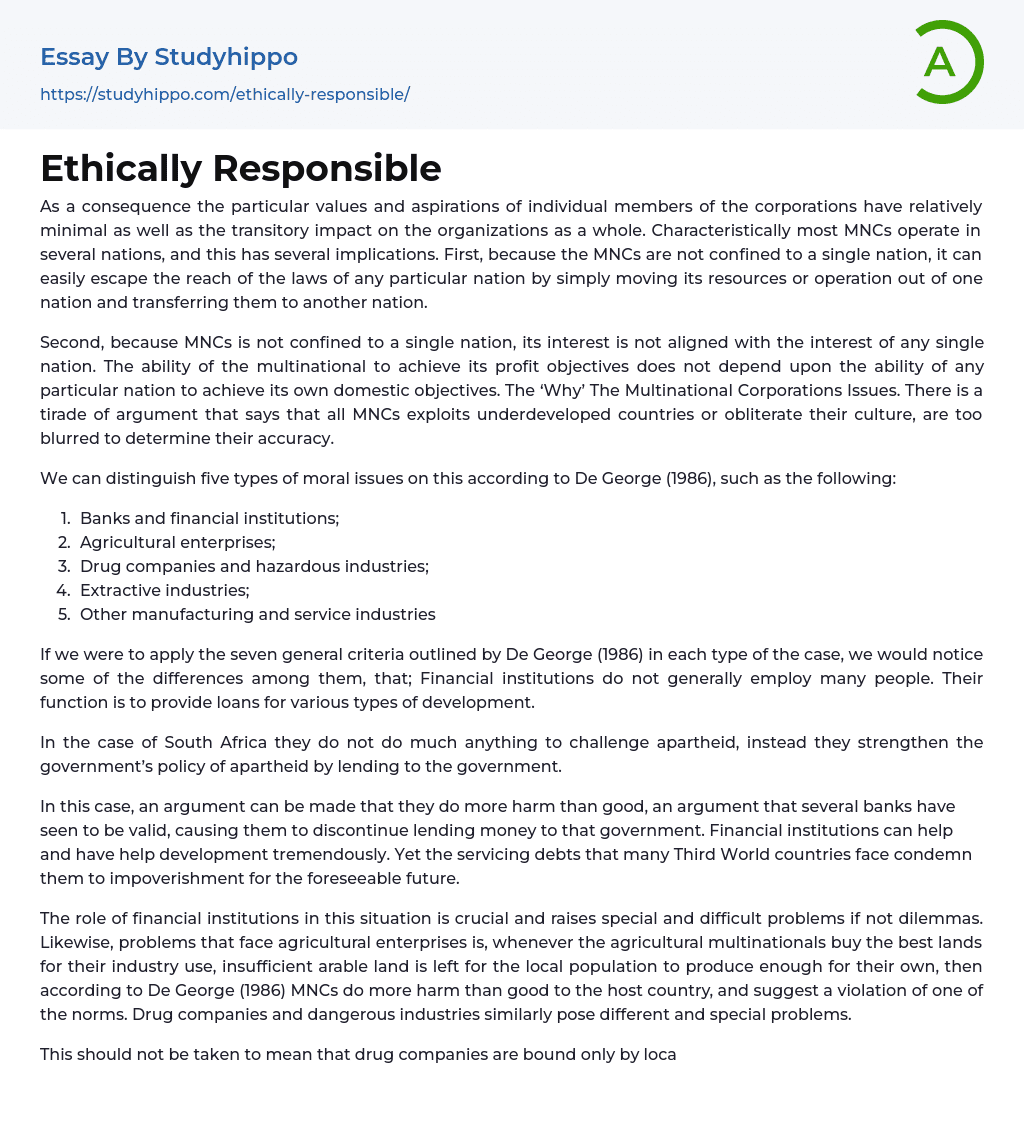MNCs are largely unaffected by the temporary and limited influence of individual members' values and aspirations. Due to their operation in multiple countries, MNCs can easily circumvent the laws of a particular country by shifting their resources or operations elsewhere.
Multinational corporations (MNCs) are not limited to one nation and don't prioritize any particular country's interests, allowing them to achieve their profit objectives independently of a specific nation's domestic goals. While there is debate over whether MNCs exploit underdeveloped countries and erode local cultures, the validity of these claims remains uncertain.
De George (1986) categorized moral issues into five types, which include:
- Banks and financial institutions;
- Agricultural enterprises;
- Drug companies and hazardous industries;
- Extractive industries;
-
Other manufacturing
...
and service industries
Applying De George's (1986) seven general criteria to each case type reveals differences between them. One such difference is that financial institutions typically have a smaller workforce and their primary purpose is to offer loans for various types of development.
South Africa's lack of action to oppose apartheid results in reinforcing the government's policy as they lend to it.
Financial institutions play a crucial role in this situation, which presents special and difficult dilemmas. In addition to that, agricultural enterprises face problems when multinational corporations purchase the best lands for their industry use. This leads to insufficient arable land for the local population to produce enough for their own needs. According to De George (1986), MNCs do more harm than good to the host country in such situations, and this suggests a violation of one of the norms.
View entire sampleJoin StudyHippo to see entire essay
Lastly, drug companies and dangerous industries also present their own unique challenges.
Although drug companies are subject to local laws, these laws may not provide adequate information or protection against intentional harm. Similarly, hazardous industries like asbestos may not need to comply with all OSHA regulations, but they cannot neglect protecting workers entirely due to moral obligations.
The ongoing protests by environmental activists against the exploitative actions of extractive industries like mining in third world countries indicate that MNCs are rightfully accused of exploitation, unless they can prove that they provide more benefits than harm to the host country. While other manufacturing industries may differ significantly, they have all faced persistent accusations of exploiting workers and eroding the culture of the host country as a whole.
Advocates for ethical considerations in international business have been increasing in recent years. They assert that small domestic companies encounter the challenges of global competition as corporations become more globally integrated and participate in cross-border transactions.
In South Africa, the government's apartheid policy and violation of human rights were not challenged. Instead, they were strengthened through the government's lending practices, although some banks did not subscribe to this policy of racial discrimination. This serves as a classic example. Drug companies operating in Third World countries also pose difficulties, including higher product prices and product waste disposal.
Environmental activists are demanding that multinational companies cease their exploitation of cheap labor and natural resources in other nations. The primary objective of businesses in every society is to generate and disseminate goods and services, ensuring that the benefits outweigh any costs incurred. The responsibility of companies to society is determined
by the requirements of the communities they operate within and influence.
The ethical implications of multinational companies and their effects on the countries they operate in are a subject of concern raised by Velasquez. It is debated whether these companies should be accountable for negative repercussions, or if the advantages outweigh the drawbacks. In situations where there is no governing body, such as numerous international transactions, Velasquez believes that moral obligations hold no significance and therefore don't exist.
Is it possible to assert that multinational corporations (MNCs) should prioritize the global common good despite objections from realists? It's important to consider that the personnel of MNCs are constantly changing, and therefore any enduring commitment to profitability in a competitive market does not necessarily indicate a lasting dedication to ethics, as explained by Velasquez.
Realists contend that multinational corporations are not obligated to contribute to the greater good, despite their responsibility to do so. As a result, in a competitive environment where there is no international authority enforcing protection against the harmful impacts of global climate change, MNCs cannot be compelled to support the global common good.
Although the Kyoto Protocol and Agenda 21 aimed to unify efforts, ethical responsibilities of transnational businesses in the countries they operate in were not adequately addressed. Multinational companies' extent of ethical responsibility towards the countries they conduct business may require a shift from rational profit-seeking to prioritizing humanitarian happiness, which includes showing respect for both fellow humans and the environment.
- Values of Life essays
- Ethical dilemma essays
- Normative Ethics essays
- Virtue Ethics essays
- Belief essays
- Deontology essays
- Moral essays
- Virtue essays
- Work Ethic essays
- Acceptance essays
- Age Of Enlightenment essays
- Child Observation essays
- Confucianism essays
- Conscience essays
- Critical Reflection essays
- Destiny essays
- Determinism essays
- Empiricism essays
- Environmentalism essays
- Epistemology essays
- Ethics essays
- Ethos essays
- Existence essays
- Existentialism essays
- Fate essays
- Free Will essays
- Functionalism essays
- Future essays
- Good And Evil essays
- Human Nature essays
- Individualism essays
- Meaning Of Life essays
- Metaphysics essays
- Natural Law essays
- Personal Philosophy essays
- Philosophers essays
- Philosophy Of Life essays
- Political Philosophy essays
- Pragmatism essays
- Reality essays
- Relativism essays
- Teaching Philosophy essays
- Time essays
- Transcendentalism essays
- Truth essays
- Utilitarianism essays
- Accounting essays
- Andrew Carnegie essays
- Automation essays
- Business Cycle essays




